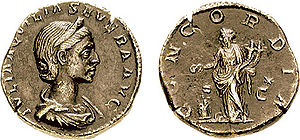
Aquilia Severa
Encyclopedia

Roman Emperor
The Roman emperor was the ruler of the Roman State during the imperial period . The Romans had no single term for the office although at any given time, a given title was associated with the emperor...
Elagabalus
Elagabalus
Elagabalus , also known as Heliogabalus, was Roman Emperor from 218 to 222. A member of the Severan Dynasty, he was Syrian on his mother's side, the son of Julia Soaemias and Sextus Varius Marcellus. Early in his youth he served as a priest of the god El-Gabal at his hometown, Emesa...
. She was the daughter of Quintus Aquilius, twice consul
Consul
Consul was the highest elected office of the Roman Republic and an appointive office under the Empire. The title was also used in other city states and also revived in modern states, notably in the First French Republic...
under Caracalla
Caracalla
Caracalla , was Roman emperor from 198 to 217. The eldest son of Septimius Severus, he ruled jointly with his younger brother Geta until he murdered the latter in 211...
. The praenomen
Praenomen
The praenomen was a personal name chosen by the parents of a Roman child. It was first bestowed on the dies lustricus , the eighth day after the birth of a girl, or the ninth day after the birth of a boy...
of Julia was given to her after becoming an empress.
Severa was a Vestal Virgin
Vestal Virgin
In ancient Roman religion, the Vestals or Vestal Virgins , were priestesses of Vesta, goddess of the hearth. The College of the Vestals and its well-being was regarded as fundamental to the continuance and security of Rome, as embodied by their cultivation of the sacred fire that could not be...
. As such, her marriage to Elagabalus in 220
220
Year 220 was a leap year starting on Saturday of the Julian calendar. At the time, it was known as the Year of the Consulship of Antonius and Eutychianus...
was the cause of enormous controversy — traditionally, the punishment for breaking the thirty-year vow of celibacy was death by being buried alive. Elagabalus is believed to have had religious reasons for marrying Severa — he himself was a follower of the eastern sun god El-Gabal, and when marrying himself to Severa, he also conducted a symbolic marriage of his god to Vesta
Vesta (mythology)
Vesta was the virgin goddess of the hearth, home, and family in Roman religion. Vesta's presence was symbolized by the sacred fire that burned at her hearth and temples...
.
Both these marriages were revoked shortly afterwards, however. This was possibly on the urging of Julia Maesa
Julia Maesa
Julia Maesa was a Roman citizen and daughter of Julius Bassianus, priest of the sun god Heliogabalus, the patron god of Emesa in the Roman province of Syria...
, the grandmother who had engineered Elagabalus' rise to the imperial throne. Elagabalus then married Annia Faustina
Annia Faustina
Annia Aurelia Faustina was an Anatolian Roman noblewoman. She was an Empress of Rome and third wife of Roman Emperor Elagabalus briefly in 221.-Ancestry & Family:...
, a more generally acceptable choice. Within a short time, however, Elagabalus had divorced Faustina and returned to living with Severa, claiming that the original divorce was invalid. It is believed that Severa remained with Elagabalus until his assassination in 222
222
Year 222 was a common year starting on Tuesday of the Julian calendar. At the time, it was known as the Year of the Consulship of Antoninus and Severus...
. The two are not believed to have had any children.
Severa's own opinions about the entire affair are not very well recorded. Some sources state that she was forced to marry
Forced marriage
Forced marriage is a term used to describe a marriage in which one or both of the parties is married without his or her consent or against his or her will...
against her will, and others go further, alleging rape
Rape
Rape is a type of sexual assault usually involving sexual intercourse, which is initiated by one or more persons against another person without that person's consent. The act may be carried out by physical force, coercion, abuse of authority or with a person who is incapable of valid consent. The...
. It is claimed by some historians, however, that many stories about Elagabalus have been exaggerated by his enemies, and so there is no certainty about what actually happened. It is unclear whether Elagabalus had any real feelings towards Severa, or whether he was more concerned with the symbolism of the marriage. Elagabalus appears to have been either homosexual
Homosexuality
Homosexuality is romantic or sexual attraction or behavior between members of the same sex or gender. As a sexual orientation, homosexuality refers to "an enduring pattern of or disposition to experience sexual, affectional, or romantic attractions" primarily or exclusively to people of the same...
or bisexual
Bisexuality
Bisexuality is sexual behavior or an orientation involving physical or romantic attraction to both males and females, especially with regard to men and women. It is one of the three main classifications of sexual orientation, along with a heterosexual and a homosexual orientation, all a part of the...
, and the historian Cassius Dio claims that Elagabalus had a more stable relationship with his chariot driver, Hierocles
Hierocles (charioteer)
Hierocles was reputedly a favorite and lover of the Roman emperor Elagabalus. He was from Caria and was at some point enslaved and became a charioteer in the service of Elagabalus...
, than with any of his wives.

